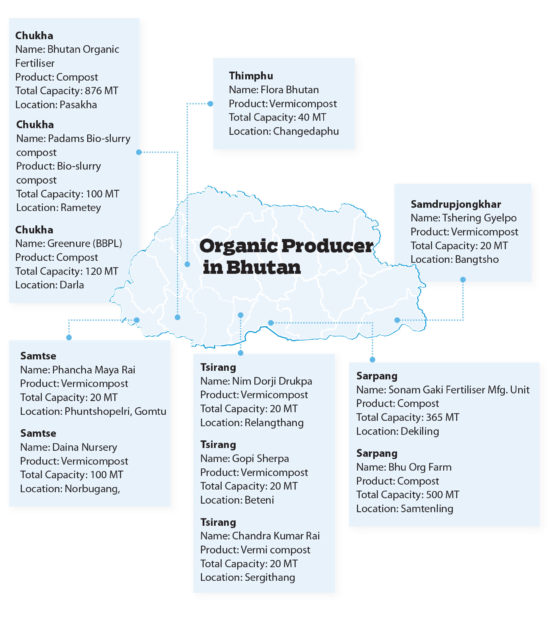Chhimi Dema
The Covid-19 pandemic and the ongoing conflict in Ukraine have disrupted the supply of fertilisers to Bhutanese farmers.
Given the shortage in the market, local organic fertiliser producers are optimistic about better business and market visibility.
Flora Bhutan’s proprietor, Deepak Chhetri, said that the business was good. “There is a huge demand for vermicompost.”
He said: “With support from the National Soil Services Centre and the National Centre for Organic Agriculture, now I can produce 40 metric tonnes (MT) in a year.”
According to Deepak, compost making has a huge market. His firm sold 8MT of vermicompost to date this year.
“I’d be interested to train youth who want to start their compost business. There is a future in the compost-making business because the demand grows each year,” he said.

Flora Bhutan’s customers include some government offices, flower nurseries, and private individuals in Thimphu.
There are 12 organic fertiliser producers in the country today producing compost, vermicompost, and bio-slurry compost according to the National Soil Services Centre records.
They are in Thimphu, Sarpang, Gelephu, Chukha, Tsirang, Samtse, and Samdrupjongkhar.
Padam’s Bio-slurry Compost located in Rametey, Chukha, produces 100MT of bio-slurry in a year.
A staff of the compost firm said that the business faces some challenges because customers are unaware. “With a little push to increase the firm’s visibility in the market, we’d get more demand to the current requirement today.”
Daina Nursery located in Samtse produces 100MT of vermicompost yearly. The firm was doing well since its establishment in 2013 until the pandemic.
Proprietor Sarad Gurung said that the movement restrictions in the dzongkhag made it difficult to transport compost to Thimphu, Paro, Haa, Punakha, and Wangdue.
“The business keeps growing because of the rising demand for compost,” he said.
The establishment provides a few kilogrammes of compost on trial to the interested farmers. He said that the customers returned to buy.
The National Soil Services Centre (NSSC)’s annual report 2020 to 2021 stated that the centre provided worms to farmers and youth interested to start vermicomposting.
About 477MT of organic fertilisers was produced from small and large-scale fertiliser production firms in the country.
Bhu Org Farm in Gelephu produces 250MT of compost yearly.
Its owner, Kamal Pradhan, said that he was hopeful that the business will improve with the country focusing on growing organic and becoming self-sufficient.
He said that with some State-Owned Enterprises (SOEs) producing organic fertilisers the growth of those newly established organic fertiliser firms could be affected.
“SOEs have support from the government that the private firms will not have,” he added.
NSSC distributed 65.79MT of locally available organic fertilisers to promote them and encourage farmers to venture into organic farming.


